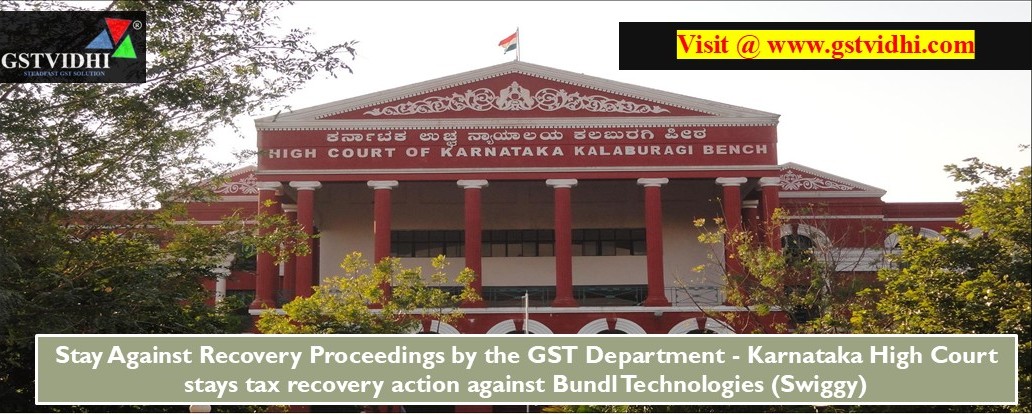
Stay Against Recovery Proceedings by the GST Department -
Karnataka High Court stays tax recovery action against Bundl Technologies
(Swiggy)
In a significant
development for the food delivery sector, the Karnataka High Court granted
temporary relief to Bundl Technologies Pvt. Ltd., the company behind Swiggy,
by putting a hold on the tax demands raised against it by the GST department.
The case revolves around whether Swiggy, as an online food delivery platform,
is liable to pay GST on the restaurant services it facilitates through
its app.
The GST authorities had
issued show cause notices and demand orders to Swiggy, alleging that it
should have paid GST for the food sold by restaurants via its platform.
However, Swiggy argued that it is merely an e-commerce operator and not
the supplier of food, and therefore should not be held responsible for the tax.
The High Court found merit in Swiggy’s arguments and observed that the
department had not followed proper procedure, leading to the issuance of an interim
stay on the tax recovery.
·
Case
Name: Bundl Technologies Pvt. Ltd. v. Union of India & Others
·
Court:
High Court of Karnataka, Bengaluru
·
Order
Number: W.P. No. 14891 of 2021 (T – RES)
·
Date
of Order: 09 November 2021
Background
of the Case
Swiggy operates a popular
online platform that connects customers with restaurants and facilitates the
delivery of food. In 2021, GST authorities issued notices to the company,
alleging that it owed tax on restaurant supplies made through its platform.
Swiggy responded by
approaching the High Court, stating that the GST department’s action was
incorrect because the company was not directly selling the food—it was only
providing a technology platform to restaurants and customers. Moreover,
the government had amended the GST rules effective January 1, 2022,
clearly stating that e-commerce operators like Swiggy would be liable for
restaurant service GST only from that date onward, not for past
transactions.
Petitioner’s
Arguments (Swiggy)
Swiggy, through its legal
team, made the following key points:
- It only facilitates food delivery
and is not the actual supplier of food or beverages.
- The GST department’s demand ignores
the law and wrongly tries to impose tax on Swiggy for services
provided by restaurants.
- The changes to GST rules making
e-commerce operators liable came into effect only from January 1, 2022,
and cannot be applied retrospectively.
- The notices lacked proper
reasoning and were issued without a fair opportunity to be heard.
- Immediate recovery action would cause
irreparable harm and should be stopped until the case is fully
heard.
Government’s
Response
The GST department
claimed that under Section 9(5) of the CGST Act, Swiggy was responsible
for collecting and paying GST on certain services made through its platform.
They argued that the notices were issued lawfully, and the company had to face
the legal process.
High
Court’s Observations
After hearing both sides,
the High Court found that Swiggy had raised valid legal concerns. The
judge noted that:
- The GST notices appeared to be issued
without properly addressing Swiggy’s representation.
- There was no clear explanation or
reasoning in the tax demand.
- Swiggy had made out a strong prima
facie case, and the Court found it fair to protect the company from
any coercive action in the meantime.
Interim
Order
The Court ordered that:
“There shall be a stay of
all further proceedings pursuant to the impugned notices.”
This means the GST
department cannot take any recovery action against Swiggy related to these
notices until the matter is finally decided.
Conclusion
This case is a crucial
one for India’s e-commerce and food delivery platforms, particularly on
the issue of GST liability for third-party services. The High Court’s
interim relief reflects the need for clarity and fairness in tax enforcement.
It also highlights that procedural lapses and unclear demands by
authorities can be successfully challenged in court.
The final outcome is
still pending, but for now, Swiggy can breathe easy, knowing that the tax
demand is on hold and the Court has acknowledged its arguments as worth
examining.
Disclaimer: All the Information is based on the notification, circular advisory and order issued by the Govt. authority and information is strictly for educational purposes and on the basis of our best understanding of laws & not binding on anyone.
Click here